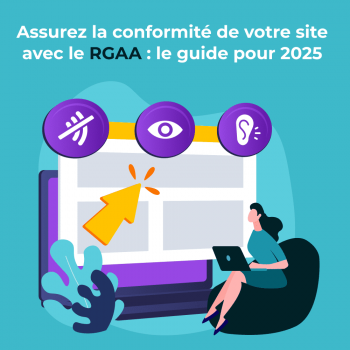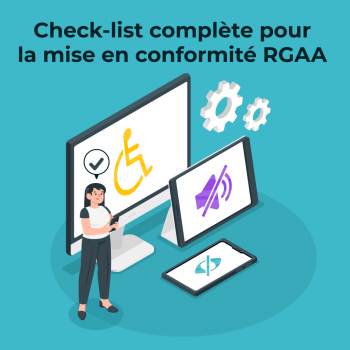Google's E-E-A-T principles date back to 2022, yet in the age of generative AI, where the volume of automatically created content is exploding, they take on far greater stakes than they did back then: distinguishing your content, being identified as a credible and reliable source, providing readers with useful and practical information. In short, to stand out from the crowd and give new consistency to the subject of SEO and its ageing methods.
Google's E-E-A-T concept (Experience, Expertise, Authority, Reliability) is emerging as an essential criterion for assessing the quality and relevance of content in this saturated digital landscape. As artificial intelligence facilitates the mass production of content, the challenge for digital professionals is to maintain a quality that meets Google's SEO requirements. The introduction of the "Experience" criterion in December 2022 has enriched the notion of E-A-T, accentuating the importance of authenticity and personal expertise.
This guide explores how E-E-A-T can help content creators stand out from the crowd. It explains the need for a more nuanced, personalized approach to content creation. In a practical way, it seeks to clarify the checklist for providing a quality response to user queries, in an environment where filtering relevant and reliable content is becoming increasingly complex.
This guide aims to provide practical guidance for content creators wishing to improve their visibility and relevance in the face of the challenges posed by AI, while meeting Google's quality standards.
Understanding Every Component of E-E-A-T
In a digital world where generative artificial intelligence is radically transforming content production, understanding and applying Google's E-E-A-T principles is a crucial strategy for standing out from the crowd. Each letter of the acronym E-E-A-T, for Experience, Expertise, Authority and Reliability, represents a pillar on which the quality and relevance of web content rests, according to the criteria established by Google and spelled out in its Google Search Essentials. These pillars form the foundation of content that not only stands out, but is also valued by Google and its users.
Experience: Experience as a guarantee of quality
Enhance your content with your personal authorial experience
The author's personal experience injects unrivalled authenticity and depth into content, which is crucial at a time when AI is generating massive volumes of text. Sharing real-life experiences, whether through travelogues, product reviews based on personal use, or case studies, enriches content in a way that AI cannot imitate. This not only helps to capture the reader's attention, but also improves the site's SEO by signaling to search engines the unique value of the content.
Differentiating AI content: putting people first
The key to differentiating from AI-generated content lies in emphasizing the human experience. Human at the center means creating content that reflects a deep, personal understanding of the subject matter. This focus on the human experience not only enriches content, but also plays a key role in establishing an authentic connection with readers, essential for building trust and authority online.
Tips for sharing your authorial experience effectively
- Adding personal opinions: integrate your unique point of view on subjects to reinforce the authenticity of the content.
- Sharing feedback: use personal or professional anecdotes to illustrate your points and make the content more credible. Highlight lessons learned to guide readers on their own journeys.
- Inclusion of case studies: demonstrate your skills and expertise through concrete examples drawn from your own experience.
- Emotional descriptions: express feelings and emotions from relevant experiences to create an emotional connection with readers.
- Use of personal photos or videos: enrich content with authentic media captured during your experiences to visually support your points.
- References to specific projects or achievements: mention projects you've worked on, challenges encountered and how you overcame them.
- Quotes from collaborations or mentors: share lessons learned from colleagues, mentors or collaborations to show the impact of human interaction on your expertise.
- Before/after comparisons: show how your methods or understanding of a subject have evolved over time thanks to experience.
Expertise: Setting the standard
The importance of real expertise in the face of AI
The author's real expertise becomes an even more crucial pillar in the age of generative AI. Unlike AI-generated content, which can lack nuance and context, human expertise brings depth, accuracy and authenticity that reinforce the credibility and value of content. In a field where information is too superficial but massive, demonstrating a deep understanding and mastery of the subject is essential to establish a trusting connection with the reader and to satisfy Google's quality criteria.
Strategies for demonstrating your expertise
- Highlight your certifications and training: highlight your relevant qualifications, certifications and training to underline your authority in the field.
- Demonstrate previous expertise: reference your previous work, publications or studies to show a consistent history of expertise.
- Quote experts: include quotes or contributions from other recognized experts in your field to reinforce your credibility and back up your words with those of other recognized experts.
- Share your in-depth analysis: offer detailed analyses of specific cases, case studies or current trends to demonstrate a nuanced understanding of the subject.
- Share your knowledge: engage through webinars, workshops or by participating in conferences as a speaker to share your expertise and increase your visibility.
- Leverage collaborations: work with other respected professionals or institutions in your field to create content, which can elevate your expert status.
- Multiply venues for expression: Show your commitment and willingness to share your expertise by actively responding to comments and questions from your audience on your site, but also on forums, social networks...
Authority: building a solid reputation
Establishing your authority in an AI-saturated domain
The authority score is a strong signal to search engines that your site is a reliable and respected reference source in your field. To emerge as an authority, it's essential to focus your efforts on creating high-quality content that brings unique, added value to your audience. This, combined with recognized expertise and an optimal user experience, lays the foundations for your credibility and online reputation. With AI enabling quantity, it's more important than ever to focus on quality.
By following a few best practices, you can improve your visibility in search results, attract a quality audience, and establish a lasting, respected online presence.
Practices for increasing your site's authority
- High-quality content: Focus on creating content that not only answers your audience's questions, but also provides unique insights based on in-depth research and proven expertise. Yes, producing content that responds to a real, identified issue is far more productive than writing about the subject that people have no interest in. Once again, E-E-A-T content must be informative and respond to a search intent.
- Quality backlinks: Encourage inbound links from reputable websites in your field. Backlinks serve as a vote of confidence in the eyes of search engines and increase your site's authority.
- Active participation in the community: Get involved in discussions, forums and social networks related to your sector. Sharing your expertise isn't just good for offering qualitative information to readers. For search engines, offering useful advice establishes you as a reliable source of information and tightens your authority score.
- Collaborations and Partnerships: Work with other experts and respected brands to create joint content. These collaborations can broaden your reach and strengthen your positioning as an authority (and expert, because, yes, a best practice can check off multiple E-E-A-T criteria so we're not going to deprive ourselves!)
- Constant updates: Keep your content current and relevant. Regularly updating your articles, guides and resources with the latest information and trends maintains the value and relevance of your site. It's not always necessary to produce new content every time there's an update! You run the risk of repeating yourself and creating cannibalization on your site. Updating existing, already referenced content is an excellent way of boosting it. It's also the perfect way to avoid leaving obsolete content lying around on your site.
- Testimonials and Reviews: Collect and display testimonials from satisfied customers or users. Positive reviews are a powerful testimony to the quality of your content, products or services.
And since it's not always about content, the E-E-A-T Authority criterion is also impacted by technical considerations. A fast, secure, easy-to-navigate site contributes positively to the user experience and reinforces your authority. Make sure your website respects the best technical SEO practices.
Reliability: trust at the heart of success
Ensuring reliability in a mass of imprecise and poorly verified information
The reliability of a website, in a digital landscape where information is abundant but often uncertain, is crucial to building a relationship of trust with users. As a reminder, generative AIs produce content that they present as truth, but which is not necessarily so. Many content producers rely inordinately on these tools without checking the reliability of the information, and to talk about subjects they don't really know enough about. So let's go back to the basics, the ones we were taught at school and which should be an important part of a journalist's work: the quality of sources and their complementarity.
Moreover, to be identified as reliable implies not only providing accurate, verifiable information, but also ensuring the security and protection of visitors' data.
Measures to reinforce user confidence
- Transparency of sources: Always cite your sources of information and give preference to reliable, recognized references in your field. Transparency about the origin of data reinforces the credibility of your content.
- Content updating and accuracy: Keep your content up to date with the latest information and research. Quickly correct any errors or out-of-date information.
- Display of Reviews and Testimonials: Integrate real reviews and testimonials from your users or customers. Positive experiences shared by others reinforce the perceived reliability of your site.
- Easy to contact: Offer your users easy and direct ways of contacting you. Open communication is essential to building and maintaining trust.
- Site security: Implement strict security measures, such as HTTPS, to protect your users' personal data. A secure site is a key factor in visitor trust.
- Clear Privacy Policy: Highlight your privacy policy and your personal data handling practices. Users need to know how their information is used and stored.
E-E-A-T: The Pillar of SEO in the AI Era for a Sustainable and Ethical Strategy
Adopting the E-E-A-T principles in SEO is crucial in an AI-transformed digital landscape, ensuring relevance and visibility in a dynamic search environment. These principles emphasize the importance of creating authentic, high-quality content that meets users' needs while building trust. The convergence of E-E-A-T with user experience (UX) and the critical topics Your Money Your Life (YMYL) reinforces the importance of producing accurate and reliable information, particularly in areas directly impacting people's lives. In the age of artificial intelligence, where content is generated at dizzying speed, E-E-A-T serves as an essential guide to maintaining quality, fostering an ethical approach and improving SEO efficiency, thus ensuring a sustainable and ethically responsible strategy.
Would you like to find out more about E-E-A-T? Don't hesitate to contact us!
Our SEO experts are on hand to answer your questions







